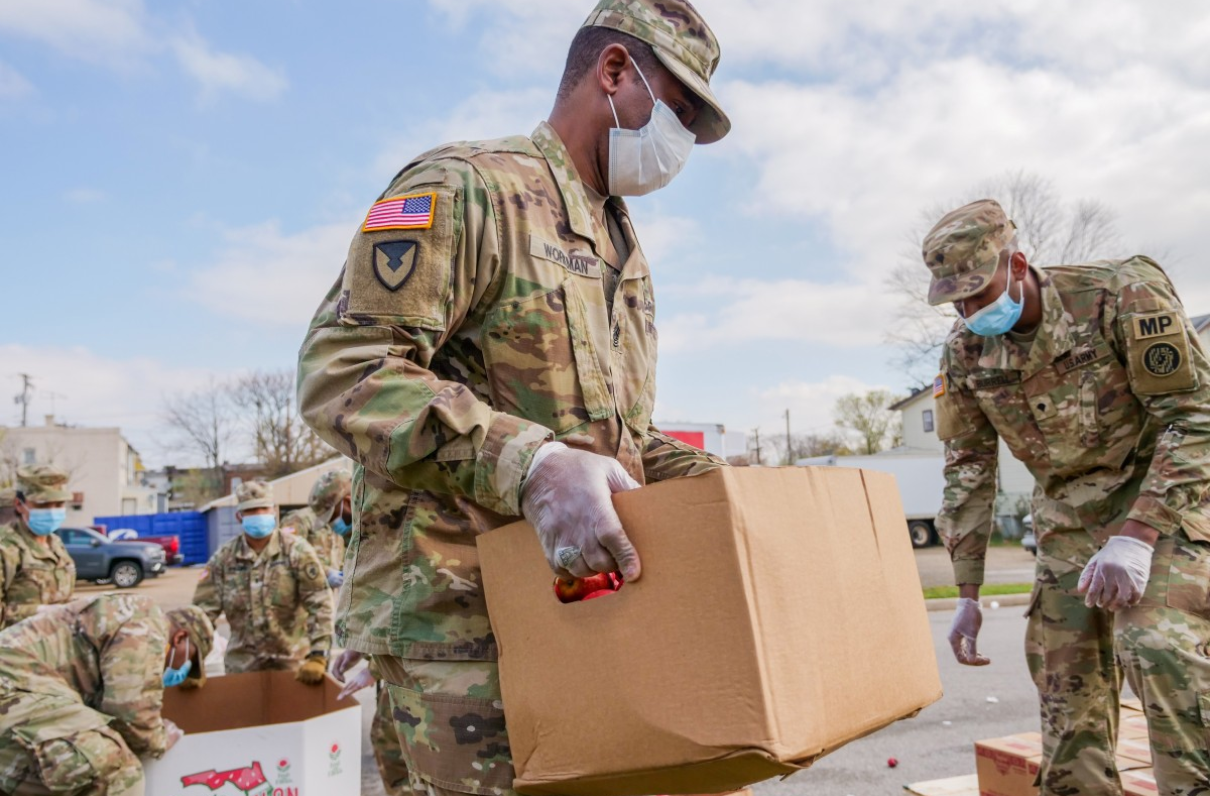This article by Kimberly Lankford will appear in an upcoming issue of Military Officer, a magazine available to all MOAA Premium and Life members. (Learn more about the magazine here; learn more about joining MOAA here.)
Everyone is facing new financial challenges because of the coronavirus. Even if you have stable employment with the military, you may have a spouse who lost a job, a side business that is struggling, or rental property with tenants who can’t pay their bills.
If you’ve retired from the military, you may have lost a second job or worry about your volatile investments. And military families face some unique challenges, such as extra expenses if you were about to move and sold your house, then abruptly faced a stop-move order delaying your PCS.
You may need extra cash to cover unexpected expenses for a few months – or longer. There are several ways to get money in an emergency without landing in expensive debt, and some special options to help with financial hardships related to the coronavirus pandemic. Here’s how to access extra money without hurting your long-term finances.
[RELATED: COVID-19 and USERRA: Know Your Re-Employment Rights]
Military Aid Societies
Every branch of the military has an aid society offering interest-free loans and grants for servicemembers and retirees who need extra cash in an emergency. The most common loan from Army Emergency Relief (AER) is $1,500 for 15 months, said Lt. Gen. Raymond Mason, USA (Ret), AER director. These societies have introduced special relief funds to help with financial hardship related to COVID-19.
“The most common thing we’re seeing is families stuck between PCS,” said Mason. “Say they were at Fort Bragg and had orders to go to Germany, and they packed up their house and shipped their car, then the stop move and stop PCS hit, and now they’re stuck in limbo. The Army has assistance as well to help them, but there are additional expenses.”
[RELATED: Tips for Your Investment Portfolio in the Coronavirus Economy]
The AER also has extended eligibility for assistance to some non-Title 10 National Guard and Army Reserve soldiers for financial hardship caused by a canceled deployment or the current DoD travel ban.
The aid societies are also helping with expenses caused by a spouse’s layoff, a quarantine, or other unexpected bills related to COVID-19. Coast Guard Mutual Assistance, for example, is providing loans to help with child care and elder care costs because schools and facilities have been temporarily closed.
As of mid-April, AER had received 97 requests and disbursed $171,000 in COVID-19 assistance funds.
“It’s a mix of loans and grants based on financial need and budget,” said Mason. “The average has been about $1,200.”
[LATEST NEWS AND GUIDANCE: MOAA.org/Coronavirus]
Navy-Marine Corps Relief Society has provided about $275,000 in COVID-19 financial assistance for 366 cases, including $500 quick-assist loans and traditional financial assistance averaging $1,740.
For more information about your service’s relief eligibility rules, visit:
- Army Emergency Relief: https://www.armyemergencyrelief.org/)
- Navy-Marine Corps Relief Society: https://www.nmcrs.org/
- Air Force Aid Society: https://afas.org/
- Coast Guard Mutual Assistance: https://www.cgmahq.org/.
The American Red Cross can also direct you to military financial assistance resources.
Some state veterans affairs offices are also providing special COVID-19 grants and loans. Minnesota, for example, is offering disaster relief grants of up to $1,000 for veterans who have been financially impacted by COVID-19, and special needs grants to help them pay their regular bills. The Indiana Department of Veterans Affairs is offering a relief fund for military families with hardships related to COVID-19. Go here for links to the State Veterans Affairs Offices.
[HOW TO HELP: Donate to MOAA's COVID-19 Relief Fund]
Financial Institutions
Many banks and credit unions are offering special low-interest loans to help families facing coronavirus-related hardships. Most lenders are offering bill-paying extensions (they usually have a coronavirus page listing details on their websites), and some relief is required by federal law. For example, the Coronavirus Aid, Relief and Economic Security (CARES) Act automatically suspends principal and interest payments on federal student loans through Sept. 30, 2020, and lets homeowners with federally backed mortgages request a forbearance on their payments for up to 180 days (which can be extended for another 180 days).
Some lenders are offering similar programs for other mortgages. The Consumer Financial Protection Bureau has assembled a list of financial resources for affected servicemembers.
[RELATED: These States Are Giving Cash to Veterans Affected by the COVID-19 Pandemic]
Your Retirement Savings
You may be able to tap your retirement savings without an early-withdrawal penalty.
You can generally borrow up to $50,000 from your Thrift Savings Plan (TSP) or a 401(k) and have five years to pay back the loan (longer for home purchases). But the CARES Act lets plans boost the loan limit up to $100,000.
The new law also lets people withdraw up to $100,000 from their retirement plans (including IRAs) without a 10% early-withdrawal penalty and gives them up to three years either to put the money back into the account or pay taxes on the withdrawal. The TSP is updating its procedures for the new loan and withdrawal provisions. You can find updates at the TSP’s COVID-19 page.
[RELATED: MOAA's Retiree Resources]
Raiding your retirement savings can hurt your finances in the long-term, so it’s much better if you can put the money back into the account within the three-year period. But even removing the money temporarily can cost you if you miss a market rebound, said Col. Curt Sheldon, USAF (Ret), owner of CL Sheldon and Co., a fee-only financial planning firm in Alexandria, Va. (and a MOAA Life Member).
“If you’re out of the market,” he said, “you could miss significant opportunities.”
Life Insurance Policy Loans
If you have a permanent life insurance policy that has built up cash value through the years, you may be able to borrow most of that cash value as an extra source of emergency funds. There’s no application and the loan doesn’t affect your credit rating. You can usually get the money within 48 hours.
“You can use it for any reason at any time,” said Quentin Doll, vice president of life insurance products for Northwestern Mutual.
For example, small-business owners have been using these loans to help pay their bills while their business has been down or closed because of the pandemic, he said. You pay interest on the loan, but there’s no repayment schedule. If you die before repaying the loan, the balance is subtracted from the death benefit.
Home-Equity Line of Credit or Cash-Out Refinancing
Today’s low interest rates make it a good time to see if you can benefit from refinancing your mortgage and lowering your monthly payments. And you may be able to borrow extra money to help with your other expenses.
With a cash-out refinancing, you can usually borrow up to 80% of the home’s value, including the mortgage and extra cash. But whenever you refinance, it’s important to assess the costs.
“Be sure to understand the up-front fees and closing costs that may apply, along with interest rates and other terms,” said Neal Stern, a CPA in Deer Park, N.Y., and member of the AICPA national CPA financial literacy commission. The AICPA’s www.360finlit.org site includes a refinancing calculator to help you assess the savings and the fees.
A home-equity line of credit can also provide a low-interest source of cash, although a few banks recently announced they would temporarily stop accepting new HELOC applications.
“Wait times for processing may be longer than usual due to high application volumes,” said Stern. “Also keep in mind that your home is collateral for these loans and you risk losing it in foreclosure if you can’t make the required payments.”
Kimberly Lankford is a freelance financial writer and military spouse from Lynchburg, Va.
Support The MOAA Foundation
Donate to help address emerging needs among currently serving and former uniformed servicemembers, retirees, and their families.


